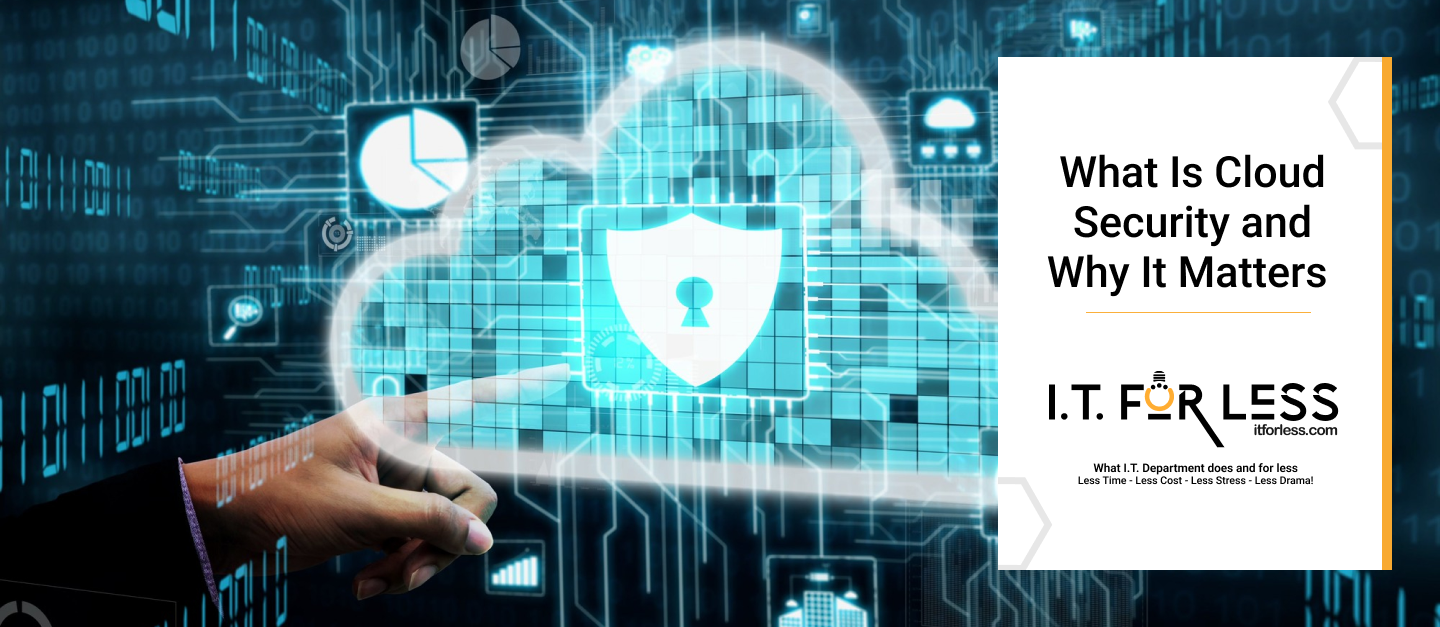In today’s fast-moving digital world, businesses of all sizes rely on the cloud for flexibility, storage, collaboration, and computing power. But with great convenience comes great responsibility — and risk. As cyberattacks grow more advanced, cloud security has become essential to protect sensitive data, ensure business continuity, and meet regulatory demands.
This article explores what cloud security is, why it matters now more than ever, and how businesses can build a strong, affordable, and scalable security posture with expert help from I.T. For Less.
What Is Cloud Security?
Cloud security refers to the policies, technologies, and practices designed to protect cloud computing environments — including data, applications, and infrastructure — from internal and external threats.
Key Cloud Environments Covered by Cloud Security:
- Public Cloud: Services hosted by third-party providers (e.g., AWS, Azure, Google Cloud)
- Private Cloud: Dedicated cloud infrastructure for a single organization
- Hybrid Cloud: Combination of public and private environments
- Multi-Cloud: Use of multiple cloud services across different vendors
Cloud security includes everything from access control and encryption to monitoring and compliance. It’s a shared responsibility between the cloud provider and the business.
The Shared Responsibility Model
Many businesses assume that once they move to the cloud, security is entirely in the hands of the provider. That’s a dangerous misconception.
Here’s how responsibility is typically split:
- Cloud Provider: Secures the physical infrastructure and the foundational software
- You (the Customer): Responsible for securing your data, user access, workloads, and configurations
Bottom line: If you misconfigure your cloud storage or reuse weak passwords, you’re still at risk — no matter how secure AWS or Azure may be.
Why Cloud Security Matters
1. Data Breaches Are on the Rise
Cloud environments are prime targets for hackers. From exposed S3 buckets to API abuse and stolen credentials, attackers are finding creative ways to get in.
Real Costs of Breaches:
- Revenue loss
- Customer churn
- Regulatory fines
- Reputational damage
2. Remote Work Expands Attack Surfaces
Employees access business data from homes, cafes, and airports. Without proper protections, these access points become security gaps.
Fix: Use multi-factor authentication (MFA), endpoint protection, and zero trust principles.
3. Compliance Demands Are Increasing
Laws like GDPR, HIPAA, and CCPA require strict data security controls. Violations can cost millions.
4. Downtime Costs Add Up Quickly
A cloud attack or outage doesn’t just risk your data — it stops your operations. Every minute of downtime costs money.
5. Customer Trust Is Fragile
Even a minor security lapse can break customer confidence. Security is a competitive advantage today.
Core Components of Cloud Security
To be fully protected in the cloud, your security strategy should cover:
1. Identity and Access Management (IAM)
- Role-based access controls (RBAC)
- Multi-factor authentication (MFA)
- Just-in-time (JIT) access
2. Data Encryption
- Encrypt data at rest and in transit
- Use cloud-native tools like AWS KMS or Azure Key Vault
3. Network Security
- Virtual firewalls and segmentation
- Intrusion detection and prevention (IDS/IPS)
4. Threat Detection and Response
- Monitor anomalies in real-time
- Use AI-powered tools to detect advanced threats
5. Compliance Monitoring
- Regular audits and reporting
- Automated compliance tools (SOC 2, HIPAA, PCI-DSS, etc.)
6. Disaster Recovery and Backup
- Automated backup schedules
- Rapid recovery plans
Common Cloud Security Challenges
- Misconfiguration: Still the #1 cause of cloud data breaches
- Stolen Credentials: Weak or reused passwords are easily compromised
- Shadow IT: Employees using unauthorized cloud tools
- Inadequate Monitoring: Threats often go undetected for weeks or months
- Lack of Expertise: Many businesses don’t have the in-house skills to secure the cloud
How I.T. For Less Helps Secure Your Cloud
We know cloud security can feel complex — especially if you’re juggling operations, growth, and compliance all at once. That’s where we come in.
At I.T. For Less, we make cloud security:
- Simple: We handle setup, audits, monitoring, and maintenance.
- Affordable: Get enterprise-level protection tailored to your budget.
- Proactive: AI-powered tools and 24/7 monitoring keep you ahead of threats.
Our Services Include:
- Cloud migration with secure configurations
- Multi-cloud and hybrid-cloud protection
- Continuous compliance monitoring
- Data loss prevention
- Threat detection and response automation
- End-user training and awareness
Whether you’re new to the cloud or running a complex multi-cloud setup, we’ve got your back.
Final Thoughts
Cloud adoption has transformed how businesses operate — but it has also created new risks. Cloud security is no longer optional; it’s critical to your survival, growth, and customer trust.
Understanding what cloud security is and acting on that knowledge could be the difference between thriving in the cloud or becoming the next cautionary tale.
Let I.T. For Less simplify your cloud security journey.
📧 Contact us | 📞 Schedule a Free Consultation | 🌐 www.itforless.com
